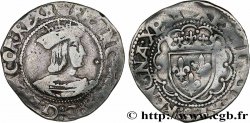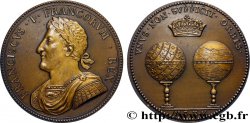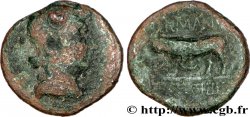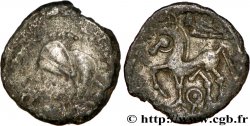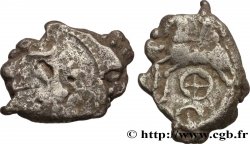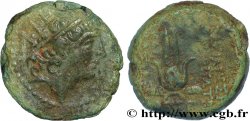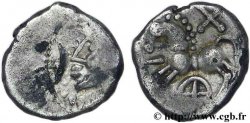正面
正面的文字 (COURONNE) FRANCISCVS^ I^ D^ GRA^ FRANCORV (MM) REX, (PONCTUATION PAR SIMPLE TRIANGLE).
正面的说明书 Buste de François Ier à droite, portant une couronne ouverte sur un chaperon.
正面的翻译 (François, par la grâce de Dieu, roi des Francs).
背面
背面的文字 (COURONNE) XP[S^] VINCIT^ XPS^ REGNAT^ XPS (MM) IMPERAT.
背面的说明书 Écu de France couronné dans un polylobe bouleté (16 lobes).
背面的翻译 (Le Christ vainc, le Christ règne, le Christ commande).
历史细节
FRANCIS I
(01/01/1515-31/03/1547)
The advent of François I traditionally marks the beginning of the Ancien Régime in France, without it being possible to grasp how it differs from the Middle Ages.. The new era is essentially distinguished by the exaltation of the very person of the king, to the detriment of more abstract concepts (the Throne, the Crown). The monarchical religion was then organized around an incarnation: heroized, identified sometimes with Caesar, sometimes with the Gallic Hercules, François I imposed himself as a warrior and as a vigilante, all at once king of war, king of the arts and king of glory. Around him, a first Court embryo was created, a first label. It was then that this "state ceremonial" was born, which American historians have made one of their main objects of study.. Born in Cognac in 1494, François was the son of Charles de Valois, Count of Angoulême and Louise de Savoie. Step-son of Louis XII, whose daughter Claude de France he married, he succeeded him in 1515, in the absence of a direct male heir of the deceased.. The new king continued the Italian policy of his predecessor. The first year of the reign of the reign was marked by a first descent into the Peninsula, with the victory of Marignan against the Swiss and the conquest of the Milanese. The following year, Francis concluded the Concordat of Bologna with Pope Leo X, which made the king the master of episcopal appointments in his kingdom, and signed a perpetual peace with the Swiss.. In 1519, on the death of Maximilian I, the King of France sought the imperial crown, but it went to the one who was to be his great rival: Charles V. This prince brings together two heritages: one, "Burgundy" and imperial, comes to him from his father, Philippe le Beau and his grandfather, the Emperor Maximilien: these are the remains of the possessions of Charles the Bold (Flanders, Franche-Comté), the domains of the Habsburgs (Austrian duchies, Lower Alsace) and the imperial crown of the Holy Roman Empire; the second, Mediterranean and Spanish, comes to him from his mother, Jeanne la Folle: these are Castile, Aragon and the Iberian "kingdoms" which are attached to them, these are the Italian possessions (Milanese, Kingdom of Naples); it will soon also be the Indies, whose conquest and organization continue under the reign of the emperor. Having failed to forge an alliance with the King of England, Henry VIII (Camp du Cloth d'Or, 1520), betrayed by the Constable of Bourbon, his main feudatory, François engaged in a difficult struggle against the Imperials, quite both in the east of France and in Italy. In 1525, after having taken over Milan, the king was beaten and taken prisoner in front of Pavia. In his absence, Louise of Savoy exercised the regency. Captive in Spain, Francis signed the Treaty of Madrid there (1526), which he renounced upon his release.. The war continued, marked by the sack of Rome by the Imperials (1527). At the Peace of Cambrai (1529), France renounced Italy and François married Éléonore of Austria, sister of Charles V. The war resumed in 1536, after Francis had forged alliances with England, Sweden, German Protestants and the Ottoman Empire.. Trier and battles alternated until the treaty of Crespy (1544) with the Emperor and of Ardres (1546) with England, which had changed sides in the meantime.. To this uncertain assessment of his foreign policy, the king could oppose that, more brilliant, of his internal management: protection given to the arts and letters, creation of the Collège de France (1529), ordinance of Villers-Cotterêts (1539), instituting civil status and imposing the use of French in official documents. Unlike other European monarchies (that of the Tudors for example), the French monarchy benefited at the beginning of the 16th century from an undisputed legitimacy, anchored in the most distant past.. Authoritarian princes, François I and his son took the opportunity to strengthen the royal power. The Council began to structure itself; the secretaries of state made their appearance. Without disappearing, the representative institutions are not able to disturb a monarchy which seems full of life and health. The reign of François I therefore appears ultimately as a first age of absolutism..







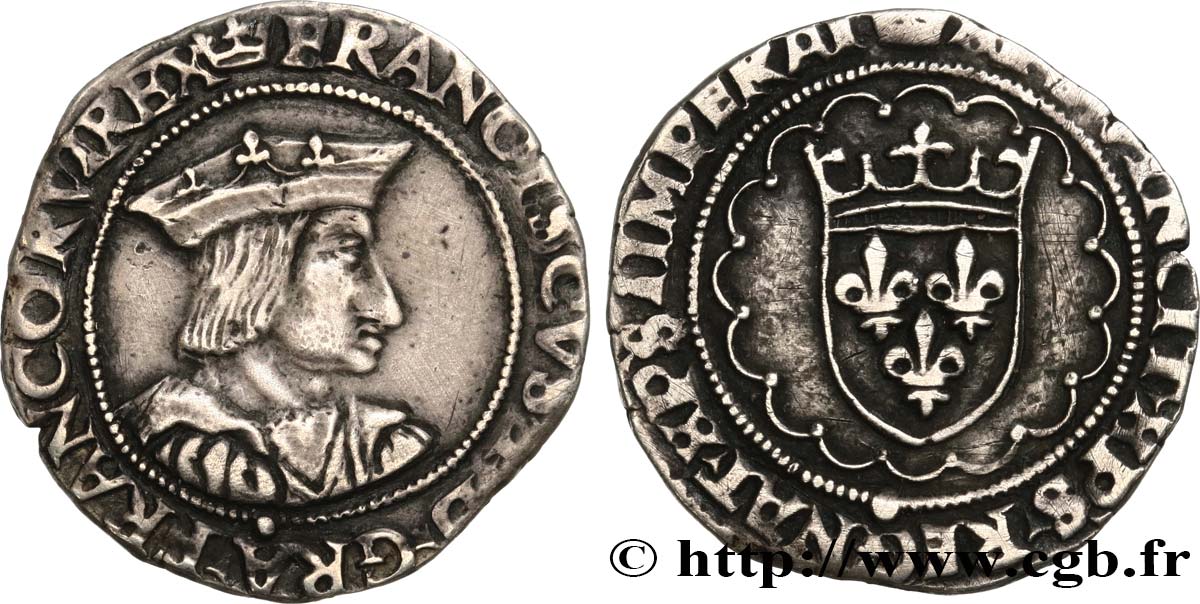
 对产品描述纠错
对产品描述纠错 打印
打印 分享我的选择
分享我的选择 提问
提问 Consign / sell
Consign / sell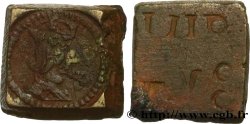
 产品介绍
产品介绍